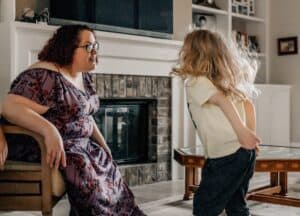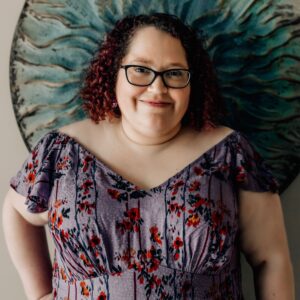I’m an autistic adult. Here is my family’s story.
While I have known about my status as an ADHDer for almost 30 years. It was only when I started learning from and about my child that anyone realized that my combination of sensory and social differences pointed to something bigger. And I’m so glad we did.
June 18, I’m taking pride on Autistic Pride Day. In my family, it’s an opportunity to see, celebrate, and embrace the full and amazing variation that exists in human experiences and perspectives.
I’m sharing my family’s story now as a love letter to autistic brains, and to the community of supporters who help us thrive. Today, I want to honor the autistic folks, educators, supportive families, advocates, and providers who nurture differently-wired kids and help them become their full, creative selves.
Whether or not you or the kids in your life are also autistic, this is also an invitation– to learn about sensory differences, to listen to autistic adults and children, and to include them in your community on their terms. I call you to lean into every child’s gifts and needs, and to more fully honor and care for your own.
Like many autistic adults, I didn’t know I was autistic until after my child was diagnosed.
Getting his diagnosis was difficult and it took a long time. Worse, it was delivered as bad news. From where I sit now, I don’t really understand why.
The thing is, learning that my child and I are autistic has changed a lot about our lives. But it hasn’t made them worse. Instead, it has opened up our world.
Recognizing and celebrating our differences has made our hearts, our lives, and our community bigger. We have a larger tent, a more diverse range of friends, a lot more joy, and a bigger toolkit for solving problems. Whether your family has autistic folks in it or not, we think you should have access to those things, too.
My kid’s autistic profile is pretty “textbook” – here’s why I say this
My child looks a lot like what you would see in a textbook about autism. Most of the research has been based on kids who look like mine and share many of his traits and interests:
- Boy toddler presenting as awkward or shy
- Language delays or significant communication differences compared to other kids
- Clear and strong sensory aversions (won’t touch shaving cream), and sensory seeking (enjoys crashing into crash pads, swings, physical play, tight hugs)
- Limited eye contact
- Super-human hearing and perfect pitch
- Recognizable stims (like flapping his hands when he is excited, or reciting scripts from his favorite scenes)
- Preference for lining up cars and other objects instead of “functional play”
Getting my kid diagnosed was still really hard. Here’s what the process looked like.
I point to my child’s “textbook” autistic traits as a way of talking about how much harder it is for people who don’t present this way to get support and a diagnosis . Girls. People with public insurance (Medicaid). People whose culture is not well-represented in medicine. People who don’t match this “autistic norm.” Teens and adults.
By the time my son was 2, we had enrolled him in Early Intervention. We knew he had language and sensory differences and so we signed him up for speech therapy and occupational therapy. As we approached his 3rd birthday, the school district evaluated him to see if they would continue those services when he aged out of EI.
At first, the district said no. In fact, it took multiple assessments over multiple years– some of which we paid for out of pocket – for my child to receive an official medical diagnosis. With the diagnosis, the school district had to re-evaluate him. This time he qualified for services.
When we got the diagnosis it was presented as bad news. But it shouldn’t have been.
I truly believe the educators and clinicians who met with my child were all well-meaning. And they were following the ways they had been trained. But getting his diagnosis was challenging partly because doctors and therapists seemed to hope that he wasn’t autistic. And that’s so sad. It misses so much of what his brain can do.
The people who were supposed to be experts in autism thought diagnosing my child as autistic was something that would hold him back. When my child was diagnosed, it was delivered as bad news.
The guidance I got from providers also didn’t match my values:
- Ignore communication unless it looked like how neurotypical kids communicate. Ignore “tv talk” or delayed echolalia.
- Make him do activities he actively disliked, even when they seemed painful, like making eye contact or spending time in loud, crowded environments.
- Take away access to his favorite toys and use them as rewards he had to earn by participating in activities adults chose.
Thankfully, I found a community of therapists and autistic adults who showed me another way forward.
And then, like a number of other parents who have autistic kids, affirming providers started to think that maybe some of the adults around my kid might actually be autistic, too, including me. So we explored that, and I received my diagnosis last year.
And you know what? It’s not a tragedy, not at all. It turned out to be great news.
Things I’ve learned since finding out we are autistic:
- Better self-regulation is worth the effort. It gives me more energy to try things that feel new or hard.
- Growth is easier when I forgive myself for struggling. Things that are hard for me are not all my fault.
- I see our bodies’ needs better. We practice techniques to get re-centered sooner, and we both have fewer meltdowns.
- I appreciate other autistic people. I love hearing about your special interests. When I see your kids develop skills to self-advocate, I’m taking pride on Autistic Pride Day and every day of the year.
- I have community among other autistic people and neuro-affirming adults who work with, support and love us.
- Concrete tools and strategies exist to support competing sensory needs in my home. We have noise-canceling headphones, swings, trampolines, and other tools.
- I let go of feeling awkward about meeting my child’s needs or my own. Look for the mom and kid in the grocery store reciting scripts or singing that one song from Moana. Sure, people might judge us, but my child feels valued, affirmed, and accepted.
- We all have to work together to build a world where our kids can grow into the best humans possible. Thankfully, lots of people want to help, and these people are gold! (or, on the periodic table of the elements, Au, atomic number 79…)
- There is no purer joy than being around a child who is encouraged to be fully themselves and loved. Being more fully myself is a great way to share that joy.
So, Join me in Taking Pride on Autistic Pride Day!
This June, I am embracing my kid and myself, and we are, with consent, inviting you in for a deep hug. And if hugging isn’t your jam? That’s totally cool and valid, too!
Would you like to hang out in the quiet corner instead? It’s all set up, with a tent and a star projector and a weighted blanket. You’re welcome anytime. We will enjoy your company just as you are, whether we parallel play, listen while you infodump about plants or vehicles, or we weigh the merits of different eating utensils for an hour.
Here’s hoping you also find joy this Autistic Pride Day! I won’t promise things will be easy, today or any day, but diagnosis can be great! I hope today offers you a chance to find your people, learn strategies that help y’all thrive, and embrace your own weird.
Learn More:
What is self-regulation and how can it help me be a better parent?




